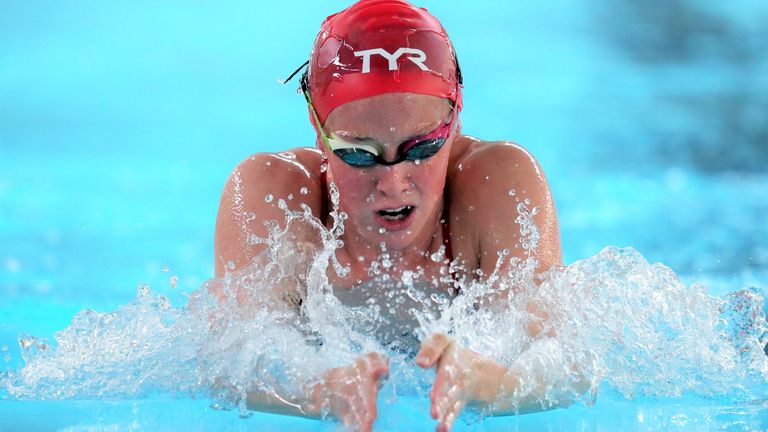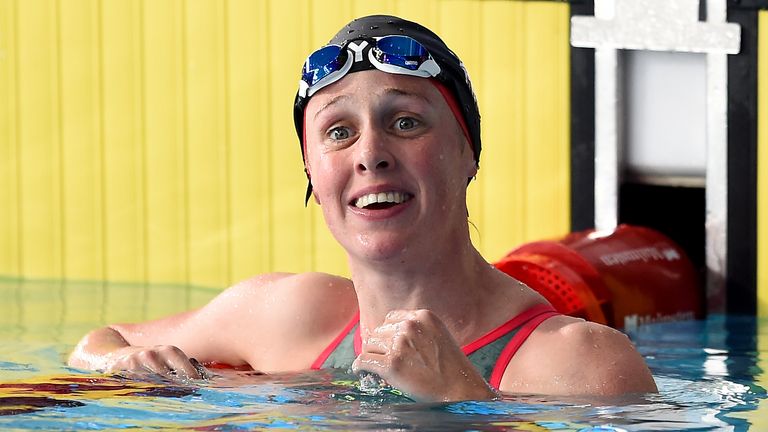
Hannah Miley believes the #SayPeriod campaign will be beneficial for changing the language and stigma around periods
Hannah Miley believes the #SayPeriod campaign will be beneficial for changing the language and stigma around periods
Former Olympic swimmer Hannah Miley is leading the way in a campaign to break the stigma around the language when talking about periods.
A group of 50 elite female athletes – including Commonwealth, European and Olympic medalists – have joined forces to urge people to #SayPeriod and standardise the language around the female body.
Today’s language of the period (“Aunt Flow”, “girls’ stuff” and circa 5,000 euphemisms) perpetuates a centuries-old stigma that even has athletes admitting they lack real period insight, knowledge and know-how.
When Miley first experienced periods while going through puberty and found it impacting her swimming both when competing and in practice, it was viewed more as a problem to be fixed rather than a natural process the body goes through.
“It was very hush, hush and as a swimmer, you are very exposed as well, so if you start without it being planned, or if you have a leak through, it is very obvious,” Miley told Sky Sports News. “It can feel horrendous as the water just makes the blood look so much more than it actually is.
“But I had a real issue, it was really heavy, really painful, and it was impacting how I was competing. I was feeling like I was very lethargic, I’d become anaemic as well. I was just training really, really hard and it was just impacting everything I was doing.
“My dad was my coach and bless him, he really wanted to figure out how, because there was no support for him as a coach, so he was having to go around telling other coaches, ‘Hannah’s started her period, she’s really struggling, what advice can you give me?’
“He was trying to reach out to the other female coaches, and I was mortified as a teenager, having your dad go around telling everyone you were on your period, but looking back now, it kind of goes to show that he was so invested in trying to understand what was happening so that he could help it.
“The national governing body doctor I had at that time recommended the way to fix the problem was to go on the pill, and put me on the pill that a lot of the other girls on the teams had been put on. I was going to be in control when I had my period, so I could never have my period when I competed again, and I thought, that’s great, that’s brilliant. That was my mindset for 17 years of competing.
“It didn’t do me any harm but looking back at it the two words I hate associated with your period is the word ‘fix’ and ‘problem’.
“‘Fix’ makes it sound like you’re broken but you’re not, this is a natural process that occurs – and it should never be a problem. It’s something that is natural, should occur, and as an athlete, you’re made to feel it’s okay if you don’t have a period.
“But, actually, it’s harmful and it’s our body’s natural way. Much like a heartbeat has to happen, a menstrual cycle has to happen for the body to be healthy. I guess I felt blown away when I found out about the information I wish I had when I was young.
“I wasn’t failed by the national body, at that time that was the research which was the best thing for it. But looking back I realise how dangerous that could have been, so that needs to change and there needs to be better research and support – and it’s not just for the athletes but the coaches as well.
“We do just need to talk openly about it, not just try and hide it, have a pill, stop your period, you don’t have to worry about it. It’s all encapsulated in being a female individual, you’ve got to work with your body, not fight against it.”

The ‘Call It What It Is’ campaign is going to be so beneficial because it’s one small change calling it a period. We have so many euphemisms and ultimately it is your period.
Hannah Miley
The former World and European short-course champion wants more information to be available for all parties, and believes much of it starts with not being afraid to use the word ‘period’ – the starting point of the ‘Call It What It Is’ campaign.
“I do believe periods should be private because it’s up to you who you tell you’re on your period, but it should never be kept secret,” Miley said.
“You should never feel forced to feel you cannot speak openly about it and that comes down to language, and that’s where the ‘Call It What It Is’ campaign is going to be so beneficial because it’s one small change calling it a period. We have so many euphemisms and ultimately it is your period.
“So, if we can get people to pledge to gradually change their language, we will build a voice so we can gradually get comfortable calling it what it is.”
Much of the campaign relates to empowering girls and women to be able to talk more openly about their period, paving the way for the next generation, as the group of athletes urge everyone to sign a pledge to #SayPeriod to help enshrine a new era of cohesive and progressive language around the female body.
“There has got to be more leeway so girls can feel comfortable in themselves because it is such a big change, and they need to feel comfortable around the word ‘period’ as well.”
“I think that comes from teachers, it comes from educators and those showing kids how to grow up. There are so many different factors within that. I do think that it is trying to change that mindset and sometimes it takes that small step along the way, so to sign the pledge for calling it what it is, calling it a period, is a small step in this change. We then have a voice, we can get resources, we can get research, that we can stop having this massive stigma around it.
“These young kids are the ones making the pathway for the next generation. They are going to come through with this knowledge and understanding, and if they can be comfortable in talking about it, then that’s going to influence the generation below them, so I think it’s really important that we get that support in.”

Former World and European short-course champion Miley wants more information about periods to be available for all
Miley is also eager to get men on board with the campaign by giving them the knowledge and understanding which enables them to relate as well.
“I think it’s really important to get men involved, especially if we can normalise the language because it stops creating barriers in partnerships, co-working relationships, coach and athlete relationships,” Miley said.
“There’s nothing worse than being put on the spot and being made to think you don’t know what you’re talking about and feeling awkward and uncomfortable. It’s difficult for some male individuals to relate to it and again it’s not their fault. It could be the way they’ve been brought up, you’ve got religion, culture, school set-up, different schools have different ways. You’ve got some schools when they talk about menstruation and sex education, the boys get taken away when they talk about girls’ stuff.
“It does stem back to that era of being at school that I think is going to be really key in that.
“It does help build a bit more of a balanced partnership when you have someone who you can talk to who understands it.”
She added: “I’ve even noticed a difference when talking to my dad about it now. I used to say ‘it’s that time of the month’ and it used to be a bit quieter so no one else could hear. But now I feel quite open and happy and he feels really quite happy that I can have those conversations with him because it builds that partnership and that relationship.
“It is important to understand because if they don’t, that’s where the joking and the jibing can come in and that’s not great.
“It sets that barrier up instantly because the person who is menstruating is not able to have that connection. It makes a big difference getting males on board.”
The campaign, started by Baz Moffat, co-founder of women’s health consultancy The Well HQ, began in late summer after a string of big-name athletes spoke out about their period-related setbacks.
Moffat said: “Over 5,000 euphemisms tells a story: we don’t like talking about periods. But if we don’t draw a line we’ll continue using euphemisms and females will suffer in perpetuity. The message seems simple but that’s its beauty: anyone can pledge to make a change and pass it on in the name of progress.”
